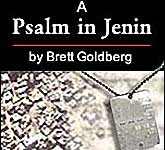Faces of the Israeli Army
By SHALOM FREEDMAN
A PSALM IN JENIN
By Brett Goldberg
304 pages. Modan Publishing House. $19.95.
In March 2002, Israel suffered the worst month of terror attacks in its
history. Over two hundred people were killed and many hundreds more injured.
This wave of attacks climaxed at Netanya’s Park Hotel, where on Seder night a
suicide bomber murdered thirty people and injured scores more. In response
to this horrifying crime, the Israeli government undertook the sort of military
operation many Israelis had been clamoring for during the previous months. Operation
Defensive Shield was launched; it turned out to be decisive in greatly reducing
Palestinian terror in the following days and months.
The most well-known focus of military action during this operation was
Jenin, the West Bank city considered the capital of Palestinian suicide-bombing.
Even before the Israeli military operation was underway, press reports emerged
throughout the world of massacres by the Israeli forces of the Palestinians in
the city and in the "refugee camp" nearby. These claims of massacre,
fueled by the Palestinian propaganda machine, led to worldwide cries of outrage
against Israel, accusations of genocide, and comparisons with the Nazis.
Palestinian spokesman Saab Erekat claimed hundreds had been murdered in
the Jenin camp. The worldwide cries led to a U.N. investigation.
This investigation concluded weeks later with a lame
admission (by a body normally hostile to Israel) that there was no evidence of
massacre at all. But the damage to Israel’s already battered image was significant.
For Jews throughout the world who saw Israel stigmatized, isolated, and made
the object of an intense and unjust attack, the whole incident was a
frightening reminder of another period, a little more than half century before,
when the Jews were also under ideological attack. Brett Goldberg, who was
living at the time very comfortably in Greenwich, Connecticut with his wife and
daughter, felt impelled to act. Goldberg was no stranger to Israel, having served
in the IDF as a tank commander and lived for seven years in the Negev
development town of Yeroham. He flew to Israel and spent the next several
months interviewing the Israeli soldiers who participated in the operation in
Jenin. A Psalm in Jenin is the
product of those interviews, and it provides a detailed and authentic picture
of both the Israeli military and the daily struggle of Israeli civilians during
this time of terror.
Goldberg does not confine himself to the military action alone but also tells
the stories of the soldiers' families. He depicts the ethnic mix of Israelis
and their moral and religious strengths. The unit he concentrates upon consists
in large part of what are known in Israel as "national-religious"
soldiers, though it includes a good mix of other types, as well.
Remarkably, Goldberg shows soldiers fighting for their lives and, at the
same time, contending with moral issues, seeking to fulfill their extremely
unpleasant duties in the most humane way possible. Despite snipers nests,
booby traps, ambushes, and above all their own losses and injuries, these
soldiers maintain their own dignity and consideration for their enemies. Many
within Israel claim this consideration was taken too far in Jenin: had Israel
acted as "normal army," some say, and bombed the camp from above (as,
for example, the U.S. did when it razed a building in Baghdad in an effort to
kill Saddam Hussein), sixteen of the Israelis soldiers who were
killed in an ambush in the camp would still be alive today.
Goldberg's book illustrates the thesis that to truly understand the way an army
works, one must look at relations within platoons and small units. The
friendship networks Goldberg presents enforce our sense of how loyalty and
courage play a central role in the life of the everyday soldier. There are no
superheroes here, but plenty of quietly courageous people, a number of
whom regrettably are lost in the battle.
Clearly and movingly written, Goldberg's book is a must read for anyone who
wishes to understand the challenges Israel, its people, and its soldiers have faced
in the past three years, and continue to face now.








